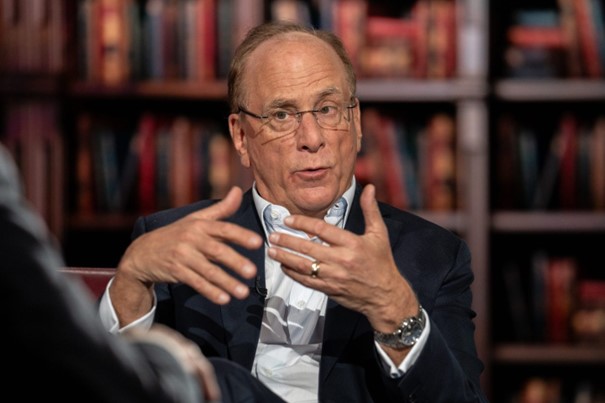
随着美国国债逼近35万亿美元大关,贝莱德(BlackRock)首席执行官拉里·芬克警告称,为了支付账单,美国必须保持经济增长,否则就有可能将难以承受的巨大负担转嫁给子孙后代。
美国的公共债务问题已逐渐提上国家议程:杰罗姆·鲍威尔(Jerome Powell)认为“是时候”就这一问题进行成人对话了,而摩根大通(JPMorgan)首席执行官杰米·戴蒙(Jamie Dimon)则认为债务是美国经济面临的“最可预测”的危机。
美国银行(Bank of America)首席执行官布莱恩·莫伊尼汉(Brian Moynihan)和特斯拉(Tesla)首席执行官埃隆·马斯克(Elon Musk)等人也发表了自己的看法,对美国联邦政府支出以及如何偿还债务表示担忧。
亿万富翁芬克也加入了这一呼声日益高涨的行列,他本周在“Squawk on the Street”上表示:“这不仅是我要传达给美国的信息,也是我如今要传达给所有国家的信息:我们的赤字率正在上升。然而,没有人花足够的时间来谈论赤字问题。美国是世界上最大的赤字开支国,而且其赤字率以世界上最快的速度增长,因此,我们需要想办法将赤字对经济、利率和通货膨胀的影响降到最低。”
专家们主要关注的不仅仅是债务规模,而是美国债务占国内生产总值的比重——事实上,一定水平的债务是必要的,也是受欢迎的。
这一因素向潜在的借贷机构表明了美国债务占国内生产总值的比重,从而也表明了美国偿还债务的能力。分析人士担心,如果这一比重过大,美国国债的买家会弃之不顾,这样美国就只能求援。
根据美国国会预算办公室(CBO)的数据,这方面几乎没有好消息。美国国会预算办公室在其最新更新中写道:“根据美国国会预算办公室目前的预测,2024年的赤字比该机构2024年2月的预测高出4000亿美元(或27%),2025-2034年期间的累计赤字比预期高出2.1万亿美元(10%)”。
据报道,到2034年,公众持有的债务将从今年占国内生产总值的99%上升到122%,超过二战结束时1946年106%的历史高点。
削减与增长
关于如何使这一比率回归正轨,通常有两种观点。看涨派希望经济增长能够抵消未来的债务和利息支出。
在争论中,持谨慎态度的一方,虽然意识到近年来支出的性质,但希望看到政府采取更多的克制措施——或者至少制定今后将如何控制支出的计划。
亿万富翁芬克坚定地站在前者一边,力促经济增长,而不是削减开支。
他告诉美国全国广播公司财经频道(CNBC):“我们需要实现增长,如果经济增长无法使我们摆脱赤字困境,赤字将成为沉重负担。我们的子孙后代无疑将承受这些我们负担不起的巨额开支。”
他补充说:"我们如今需要私营业务不受任何约束,以实现增长。我们将利用私营部门的发展实现增长。我们不能再依赖公共赤字了——公共赤字占国内生产总值的比重增长得太快了。”
“这是闻所未闻的。如今的赤字达到不可持续的水平,但我们拥有世界上最具活力的资本主义体系,实力雄厚的公司,无与伦比的创造力和伟大的技术。摆脱束缚,让它自由发展,就能创造大量的就业机会,并带来发展机遇,我们就会拥有不断上涨的股票市场,这无疑将为这一发展机遇提供动力。”(财富中文网)
译者:中慧言-王芳
随着美国国债逼近35万亿美元大关,贝莱德(BlackRock)首席执行官拉里·芬克警告称,为了支付账单,美国必须保持经济增长,否则就有可能将难以承受的巨大负担转嫁给子孙后代。
美国的公共债务问题已逐渐提上国家议程:杰罗姆·鲍威尔(Jerome Powell)认为“是时候”就这一问题进行成人对话了,而摩根大通(JPMorgan)首席执行官杰米·戴蒙(Jamie Dimon)则认为债务是美国经济面临的“最可预测”的危机。
美国银行(Bank of America)首席执行官布莱恩·莫伊尼汉(Brian Moynihan)和特斯拉(Tesla)首席执行官埃隆·马斯克(Elon Musk)等人也发表了自己的看法,对美国联邦政府支出以及如何偿还债务表示担忧。
亿万富翁芬克也加入了这一呼声日益高涨的行列,他本周在“Squawk on the Street”上表示:“这不仅是我要传达给美国的信息,也是我如今要传达给所有国家的信息:我们的赤字率正在上升。然而,没有人花足够的时间来谈论赤字问题。美国是世界上最大的赤字开支国,而且其赤字率以世界上最快的速度增长,因此,我们需要想办法将赤字对经济、利率和通货膨胀的影响降到最低。”
专家们主要关注的不仅仅是债务规模,而是美国债务占国内生产总值的比重——事实上,一定水平的债务是必要的,也是受欢迎的。
这一因素向潜在的借贷机构表明了美国债务占国内生产总值的比重,从而也表明了美国偿还债务的能力。分析人士担心,如果这一比重过大,美国国债的买家会弃之不顾,这样美国就只能求援。
根据美国国会预算办公室(CBO)的数据,这方面几乎没有好消息。美国国会预算办公室在其最新更新中写道:“根据美国国会预算办公室目前的预测,2024年的赤字比该机构2024年2月的预测高出4000亿美元(或27%),2025-2034年期间的累计赤字比预期高出2.1万亿美元(10%)”。
据报道,到2034年,公众持有的债务将从今年占国内生产总值的99%上升到122%,超过二战结束时1946年106%的历史高点。
削减与增长
关于如何使这一比率回归正轨,通常有两种观点。看涨派希望经济增长能够抵消未来的债务和利息支出。
在争论中,持谨慎态度的一方,虽然意识到近年来支出的性质,但希望看到政府采取更多的克制措施——或者至少制定今后将如何控制支出的计划。
亿万富翁芬克坚定地站在前者一边,力促经济增长,而不是削减开支。
他告诉美国全国广播公司财经频道(CNBC):“我们需要实现增长,如果经济增长无法使我们摆脱赤字困境,赤字将成为沉重负担。我们的子孙后代无疑将承受这些我们负担不起的巨额开支。”
他补充说:"我们如今需要私营业务不受任何约束,以实现增长。我们将利用私营部门的发展实现增长。我们不能再依赖公共赤字了——公共赤字占国内生产总值的比重增长得太快了。”
“这是闻所未闻的。如今的赤字达到不可持续的水平,但我们拥有世界上最具活力的资本主义体系,实力雄厚的公司,无与伦比的创造力和伟大的技术。摆脱束缚,让它自由发展,就能创造大量的就业机会,并带来发展机遇,我们就会拥有不断上涨的股票市场,这无疑将为这一发展机遇提供动力。”(财富中文网)
译者:中慧言-王芳
JEENAH MOON—BLOOMBERG/GETTY IMAGES
As America’s national debt nears the $35 trillion mark, BlackRock CEO Larry Fink has warned the country’s growth must keep up in order to pay its bills—or risk passing on a huge, unaffordable burden to coming generations.
The United States’ public debt is an issue that has been steadily climbing the national agenda: Jerome Powell believes it’s “past time” to have an adult conversation about the issue, while JPMorgan CEO Jamie Dimon believes debt is the “most predictable” crisis facing the American economy.
The likes of Bank of America CEO Brian Moynihan and Tesla CEO Elon Musk have also weighed in, voicing concerns about how much Uncle Sam is spending and how the nation will afford to service its debt.
Billionaire Fink has added his name to the growing chorus, telling Squawk on the Street this week: “This is my message not just to the U.S. but to every country right now: We have rising deficits. No one is spending enough time talking about deficits. The U.S. deficits are the largest in the world—growing at the fastest rate in the world—and we need to be finding ways to minimize the role of the deficit on the economy, on interest rates, on inflation.”
The main concern of experts isn’t simply the volume of debt—indeed, a certain level of debt is necessary and welcomed—but America’s debt-to-GDP ratio.
This factor indicates to potential lenders how much the country owes versus what it produces and thus, how able it is to pay it back. If the ratio tips too high, analysts fear buyers of U.S. debt will turn their backs, leaving the nation cap in hand.
According to the Congressional Budget Office (CBO) there’s little good news on that front. In its latest update the CBO wrote, “In CBO’s current projections, the deficit for 2024 is $400 billion (or 27%) larger than it was in the agency’s February 2024 projections, and the cumulative deficit over the 2025–2034 period is larger by $2.1 trillion (10%).”
It reported debt held by the public will rise from 99% of GDP this year to 122% by 2034—surpassing its previous high of 106% in 1946, at the end of the Second World War.
Cuts vs. growth
There are generally two schools of thought on how to bring this ratio back into line. Those on the bullish end are hopeful that an uptick in economic growth will offset the debt and interest payments in future.
On the more cautious side of the argument are those who, while conscious of the nature of spending in recent years, want to see administrations exercise more restraint—or at least set out a plan for how they will curb outlays in the future.
Billionaire Fink is firmly on the side of the former, pushing for growth as opposed to curbing spending.
He told CNBC, “We need to grow, and if we can’t grow out of it these deficits are going to become a big burden. We’re going to really be putting on the backs of our children and our grandchildren a real burden of these massive, massive spends that we can’t afford.
“We need unfettered businesses right now,” he added. “We need growth. And we’re going to get growth from the private sector. We can’t rely on public deficits anymore—the public deficits are just growing too fast as a percentage of GDP.
“This is unheard-of. It’s at an unsustainable level, yet we have the most dynamic, capitalistic system in the world. We have great companies, we have great ingenuity, great technology. Let it unbound, let it go, create great jobs, create opportunity, and we’ll have a rising equity market that will really fuel this opportunity.”






